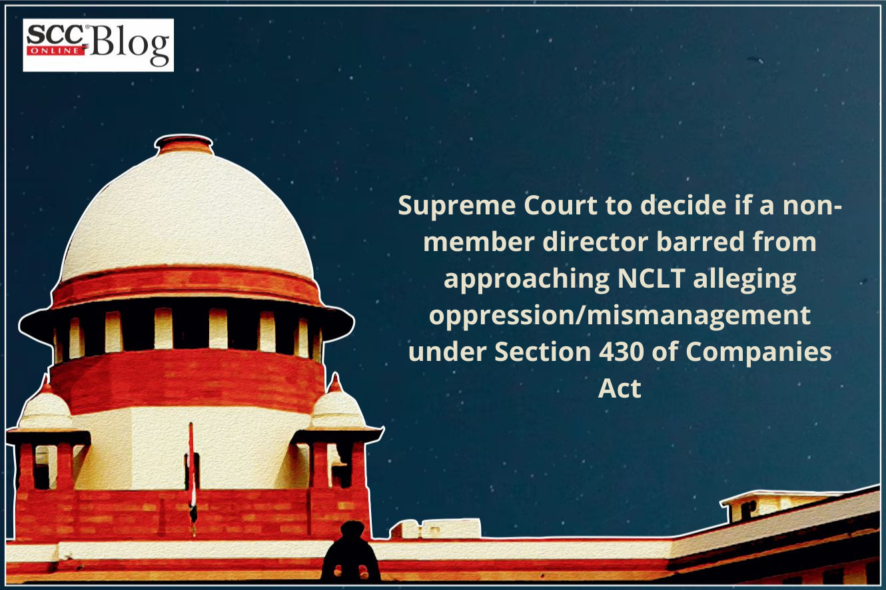Supreme Court: The Division Bench of Dinesh Maheshwari and Aniruddha Bose, JJ., issued notice to Topworth Urja & Metals Ltd. in a case alleging oppression and mismanagement in appointment of additional directors.
The question of law before the Court was whether a non-member/non-shareholder director is barred from raising a dispute regarding oppression/mismanagement and the illegal appointments of directors before the Civil Court u/s 430 of the Companies Act, 2013?
The appellant, Manish Kumar was holding the directorship in the respondent Company, which was engaged in the business of manufacturing of state-of-art range of steel, pipes, tubes, mining offered steel et cetera. The grievance of the appellant was that the respondent company had illegally appointed respondents 2 to 6 as the Additional Directors of the company. Further, the appellant alleged that the appointment was made without giving notice to the appellant and other aggrieved directors.
Therefore, the appellant had approached the Civil Court, alleging that the conduct of the company amounted to mismanagement qua the directorial appointments which were per se illegal in nature and were made with the intention to siphon off funds. The Civil Court had dismissed the application and relegated the appellant to National Company Law Tribunal (NCLT) to agitate his issues.
Aggrieved, the appellant approached the Bombay High Court seeking declaration that the alleged appointment of directors was illegal and void-ab-initio and to restore status quo ante with respect to directorship as on 23-11-2021. The appellant argued that he being a director without being a shareholder was not a ‘member’ within the meaning of Section 2(55), therefore, he could not seek relief for oppression before NCLT u/s 241 of the Act, 2013, since the said section is restricted to “a member of the Company”.
Rejecting the contentions of the appellant, the High Court held that the word ‘matter’ used in Section 430 is of wide amplitude and it cannot be read in a constricted way to limit it to an individual, but it will have to be given the widest meaning to cover any matter which the Tribunal is empowered to determine under the Act and this would necessarily cover the dispute regarding the affairs of the Company alleged to be conducted prejudicial to the interest of the Company or even any allegation of oppression or mismanagement.
Therefore, dismissing the appeal, the High Court observed that if any person, who is interested in the affairs of the Company alleges mismanagement or oppression, he shall not be restrained from knocking the doors of the Tribunal merely because the words employed in Section 241.
The High Court held that the words ‘any member’ if read constrictively and confining it only to member as defined, it would result in defeating the intention of law makers, who created the special Tribunal with exclusive jurisdiction only for corporate and reduce the multiplicity of litigation before different forums, including civil courts and to provide justice at close range.
The appellant had challenged the impugned High Court order stating that both the Civil Court and the High Court had fell into grave error by misinterpreting the law on the issue of jurisdiction under Section 430 of the Companies Act, 2013 and relegating the appellant to approach NCLT.
Further, the appellant alleged that the both the Civil Court and the High Court had erroneously relied on Chiranjeevi Rathnam vs. Ramesh, (2017) SCC OnLine Mad 23049, and had failed to appreciate the plain interpretation of the wording of Sections 2(34), 2 (55) and Section 244 of the Act, 2013.
Reliance was placed by the appellant on the decision of NCLT in Jithendra Parlapalli v. Wirecard India (P) Ltd. (judgment dated 16-02-2022), wherein the NCLT had, by detailed reasoning, distinguished the judgment of Chiranjeevi (supra) and held that, a non-member director cannot file an application before NCLT under Sections 241 and 242 of Companies Act, 2013 due to the embargo under Sec. 244 of the Companies Act, 2013.
The Court had issued notice to the respondent company.
[Manish Kumar v. Topworth Urja & Metals Ltd., Special Leave to Appeal (C) No. 9191 of 2022, order dated 18-05-2022]
Appearance by:
For Petitioner(s): Siddharth Bhatnagar, Sr. Adv.
Swarnendu Chatterjee, AOR
Aditya S., Adv.
Pranav Auhad, Adv.
Darshana Naval, Adv.
Yashwardhan Singh, Adv.
Kamini Sharma, Editorial Assistant has put this report together






